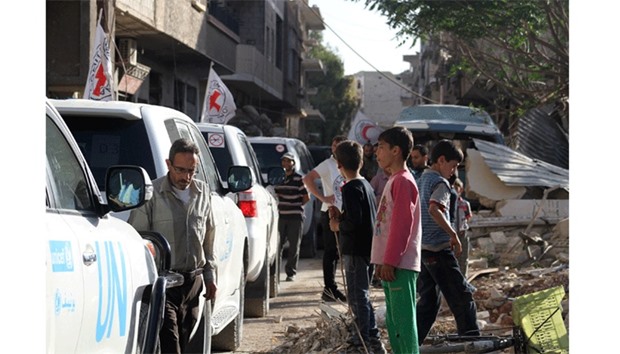The besieged Syrian town of Daraya, a rebel-held suburb of Damascus where President Bashar al-Assad has refused to allow aid to starving Syrians, got its first UN
aid convoy since 2012 yesterday.
Russia’s Defence Ministry said it had co-ordinated a 48-hour local ceasefire, a “regime of calm”, with the Syrian authorities and with the United States “to secure delivery of humanitarian aid to the population”.
Syrian opposition negotiator Basma Kodmani said the aid to Daraya and nearby Mouadamiya, another besieged zone, was only a first step that had come about as a result of extreme international pressure on the Syrian government, and substantial change was still needed.
“The first lesson is that pressure and ultimatums are the only way we get the regime to hear anything,” she said.”We will obviously not be content with one convoy as happened today.”
The trucks got through on the day when the Syrian government faced a deadline to admit aid by road or risk having air drops imposed by the countries of the International Syria Support Group (ISSG), which includes Syria’s ally Russia.
“If we don’t see substantial change, then we definitely are waiting for those air drops to happen as a sign of the seriousness and the commitment of the international community,” Kodmani said.
British Foreign Secretary Philip Hammond said Syria’s government had “cynically allowed limited amounts of aid” into the two besieged areas but failed to deliver the widespread humanitarian access called for by the international community.
“While air drops are complex, costly and risky, they are now the last resort to relieve human suffering across many besieged areas,” he said in a statement.”Countries with influence over the Assad regime such as Russia and Iran must now ensure that these air operations can proceed in a safe and secure manner.”
The aid to Daraya contained medical supplies, vaccines, baby milk and nutrition items, but no food.
Jakob Kern, the World Food Programme director in Syria, said the government had not allowed food in the first delivery, but another convoy with food was planned for Friday, and he expected the fighting would be suspended again to allow that aid in.
The United Nations has previously warned that children could die of starvation because of the “horrendously critical” situation in Daraya, Mouadamiya, and a third area, Al Waer, which did not receive any aid yesterday.
Kern said there was some movement on food for Al Waer, but he did not yet have details.
He said it was too soon to say if there was an overall breakthrough on aid access.
The UN estimates 4,000 civilians are still in Daraya, which is close to a large air base and has been besieged and regularly bombed since 2012.
Some 45,000 people are in Mouadamiya, but government employees are now allowed to go in and out and the siege is “partially over”, with a local truce, Kern said.
Staffan de Mistura, the UN
mediator of Syria peace talks, has said he wants to see improved humanitarian access, as well as a renewed lull in the fighting, before announcing a date for a new round of peace talks in Geneva.
The ISSG humanitarian taskforce will meet today to review progress on getting aid to more than a mn needy people in besieged and hard-to-reach areas.
Kodmani said they should not be fooled by the Syrian government allowing in one convoy “to defuse the pressure”.
“If it is going to become tit-for-tat, a convoy for a date, this is not going to work,” she said.
A return to peace talks, after a last round which ended on April 28 amid a spiral of violence, was likely if the international community kept up the pressure on Assad’s government, she said.
The opposition High Negotiations Committee has proposed a nationwide truce during the month of Ramadan, which would restore the “cessation of hostilities” that prevailed for two months from the end of February.

Vehicles of the International Committee of the Red Cross (ICRC), the Syrian Arab Red Crescent and the United Nations wait on a street after an aid convoy entered the rebel-held Syrian town of Daraya, southwest of the capital Damascus, yesterday.
